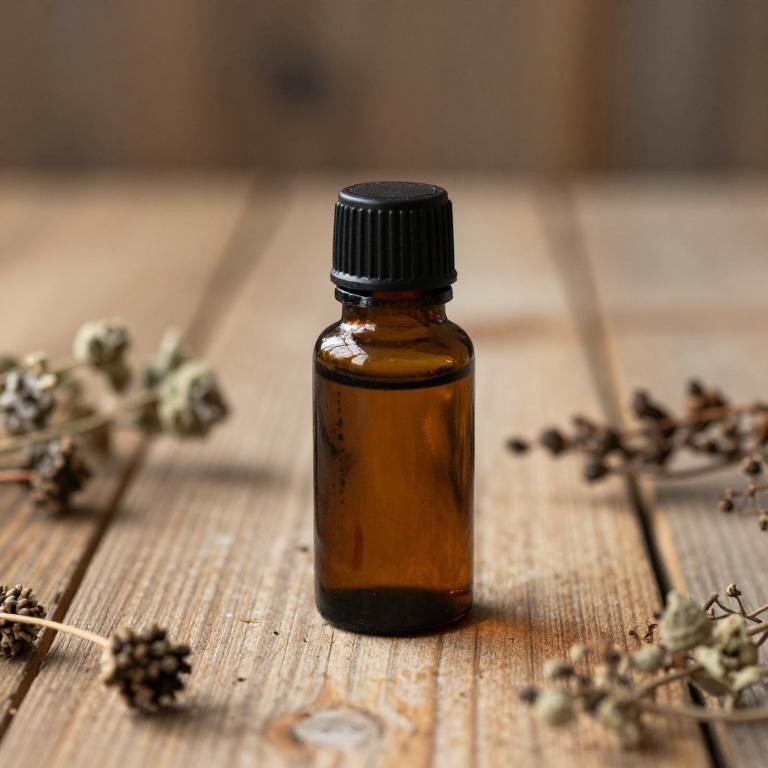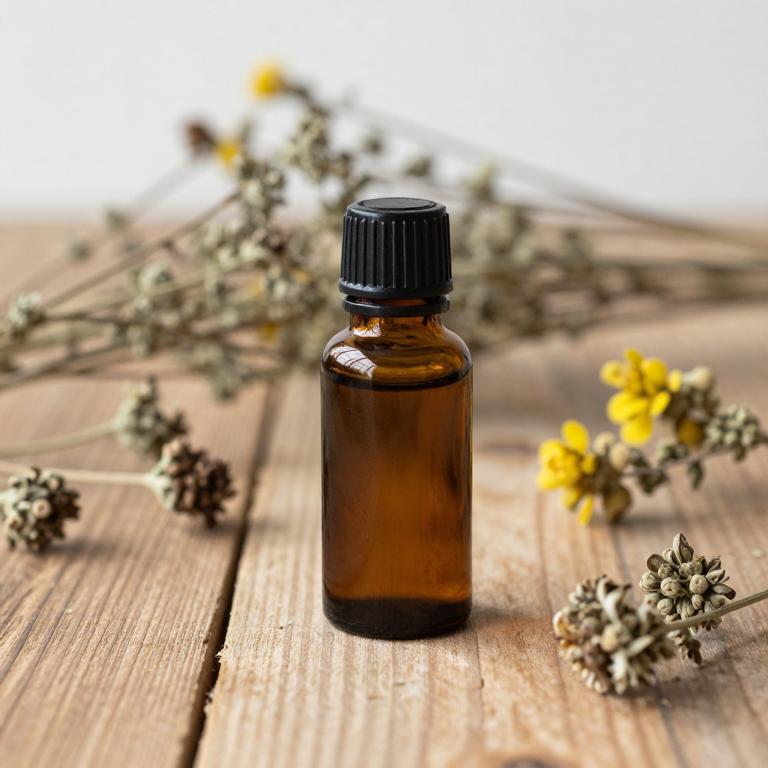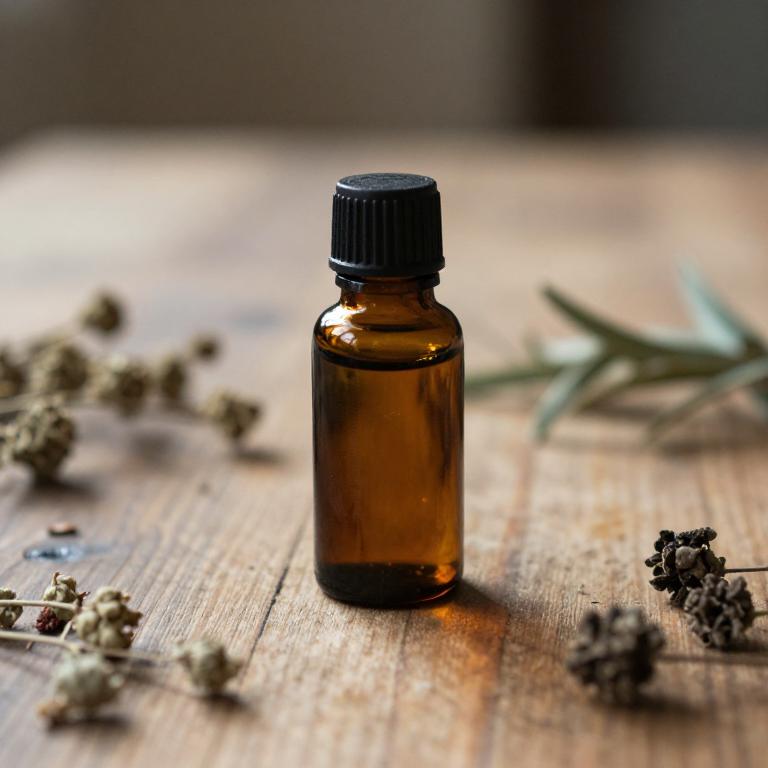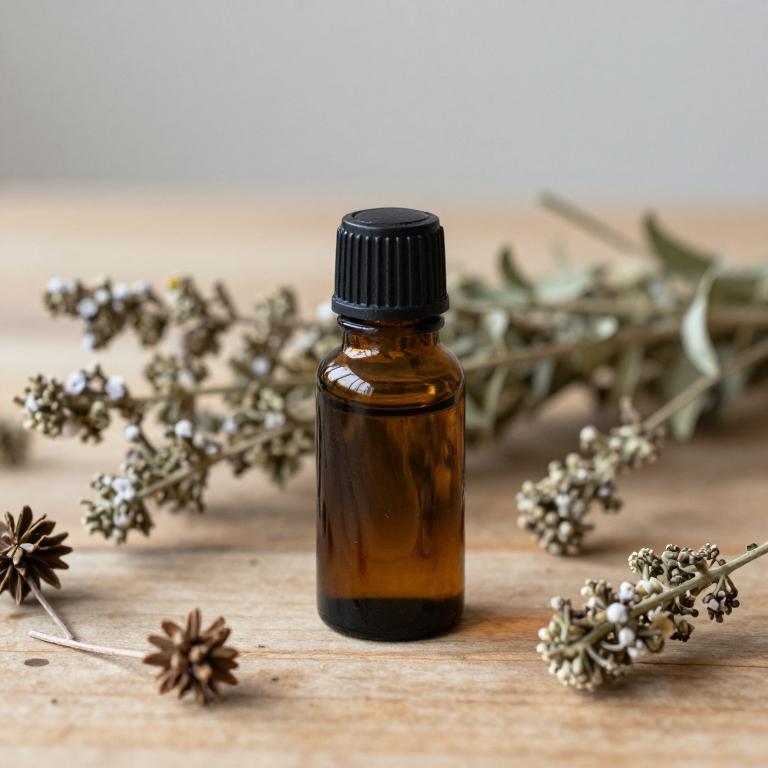10 Best Herbal Essential Oils For Jock Itch

Herbal essential oils have gained popularity as natural remedies for jock itch due to their antifungal and antimicrobial properties.
Oils such as tea tree, lavender, and oregano are commonly used because they can help reduce fungal growth and soothe irritated skin. These oils are typically diluted with a carrier oil before application to prevent skin irritation and ensure safe use. When applied topically, they may help alleviate symptoms like itching and redness associated with jock itch.
However, it is important to consult a healthcare professional before using essential oils, especially if the infection is severe or persistent.
Table of Contents
- 1. English lavender (Lavandula angustifolia)
- 2. Eucalyptus (Eucalyptus globulus)
- 3. Thyme (Thymus vulgaris)
- 4. Melaleuca (Melaleuca alternifolia)
- 5. Ceylon cinnamon (Cinnamomum zeylanicum)
- 6. Rosemary (Rosmarinus officinalis)
- 7. Pogostemon (Pogostemon cablin)
- 8. Polium germander (Teucrium polium)
- 9. Lemon grass (Cymbopogon citratus)
- 10. Greek oregano (Satureja hortensis)
1. English lavender (Lavandula angustifolia)

Lavandula angustifolia, commonly known as English lavender, is widely recognized for its calming properties and pleasant aroma, but it also possesses antimicrobial and antifungal characteristics that make it a valuable component in treating jock itch.
The essential oil derived from this plant contains compounds such as linalool and linalyl acetate, which have been shown to inhibit the growth of fungi, including those responsible for jock itch, such as Tinea cruris. When diluted properly with a carrier oil, lavender essential oil can be applied topically to the affected area to help reduce itching, redness, and inflammation associated with the condition. However, it is important to consult a healthcare professional before using essential oils, as they can cause skin irritation in some individuals.
Overall, lavender essential oil offers a natural and effective alternative for managing symptoms of jock itch when used safely and appropriately.
2. Eucalyptus (Eucalyptus globulus)

Eucalyptus globulus, also known as blue gum eucalyptus, is a popular source of essential oil commonly used in natural remedies due to its antimicrobial and anti-inflammatory properties.
This essential oil contains compounds like eucalyptol and cineole, which may help combat fungal infections such as jock itch by inhibiting the growth of dermatophytes. While some studies suggest its potential as a topical treatment for fungal infections, more research is needed to confirm its efficacy and safety for this specific condition. When using eucalyptus globulus oil for jock itch, it should always be diluted with a carrier oil to avoid skin irritation.
As with any herbal remedy, it is advisable to consult a healthcare professional before incorporating it into a treatment regimen.
3. Thyme (Thymus vulgaris)

Thymus vulgaris, commonly known as thyme, is a herb that contains essential oils rich in compounds like thymol and carvacrol, which have potent antifungal and antimicrobial properties.
These essential oils are often used in natural remedies for skin conditions such as jock itch, which is caused by fungal infections. When properly diluted, thyme essential oil can help combat the fungi responsible for jock itch by inhibiting their growth and reducing inflammation. However, it is important to use thyme oil with caution, as it can be irritating to the skin if not properly diluted.
Always consult a healthcare professional before using essential oils for medical conditions to ensure safe and effective treatment.
4. Melaleuca (Melaleuca alternifolia)

Melaleuca alternifolia, commonly known as tea tree oil, is a popular essential oil derived from the leaves of the Melaleuca alternifolia plant native to Australia.
It is widely recognized for its potent antimicrobial, antifungal, and anti-inflammatory properties, making it a valuable natural remedy for various skin conditions, including jock itch. Jock itch, a fungal infection caused by dermatophytes, often affects the groin area and can be challenging to treat with conventional antifungal medications. Tea tree oil has been shown in several studies to inhibit the growth of fungi responsible for jock itch, offering a safe and effective alternative or complementary treatment.
When properly diluted with a carrier oil, tea tree oil can be applied topically to the affected area to reduce symptoms such as itching, redness, and discomfort associated with jock itch.
5. Ceylon cinnamon (Cinnamomum zeylanicum)

Cinnamomum zeylanicum, commonly known as cinnamon, is a plant whose essential oil has been traditionally used for its antimicrobial and anti-inflammatory properties.
The essential oil derived from its bark contains compounds like cinnamaldehyde, which exhibit potent antifungal activity, making it a promising natural remedy for fungal infections such as jock itch. Studies suggest that cinnamon oil can inhibit the growth of dermatophytes, the fungi responsible for jock itch, thereby reducing symptoms like itching and redness. When applied topically, cinnamon essential oil may help soothe the affected area and promote healing.
However, it is important to dilute the oil properly with a carrier oil to avoid skin irritation and ensure safe usage.
6. Rosemary (Rosmarinus officinalis)

Rosmarinus officinalis, commonly known as rosemary, produces an essential oil that has been explored for its potential benefits in treating jock itch, a fungal infection caused by dermatophytes.
The oil contains compounds like camphor, cineole, and borneol, which exhibit antifungal, antimicrobial, and anti-inflammatory properties. These properties may help reduce the symptoms of jock itch by inhibiting fungal growth and soothing the affected skin. However, while some studies suggest its effectiveness, more clinical research is needed to confirm its efficacy as a standalone treatment.
It is often recommended to use rosemary essential oil in combination with other antifungal agents and under the guidance of a healthcare professional for optimal results.
7. Pogostemon (Pogostemon cablin)

Pogostemon cablin, also known as Java citronella, is a plant commonly used in the production of essential oils that have been explored for their potential antifungal properties.
These essential oils contain compounds like citral and geraniol, which may help inhibit the growth of fungi responsible for jock itch, such as Trichophyton rubrum. While some preliminary studies suggest that pogostemon essential oils could be a natural alternative for managing fungal infections, more clinical research is needed to confirm their efficacy and safety for topical use. When considering essential oils for jock itch, it is important to dilute them properly and consult a healthcare professional to avoid skin irritation or allergic reactions.
Overall, pogostemon cablin essential oils may offer a complementary approach to traditional treatments, but they should not replace medical advice or prescribed antifungal medications.
8. Polium germander (Teucrium polium)

Teucrium polium, also known as summer savory, is a herb that contains essential oils with potential antifungal properties, making it a subject of interest for treating conditions like jock itch.
The essential oils derived from Teucrium polium are rich in compounds such as thymol and carvacrol, which are known for their antimicrobial and antifungal activities. Preliminary studies suggest that these oils may inhibit the growth of fungi responsible for jock itch, such as Trichophyton rubrum. However, more clinical research is needed to confirm their efficacy and safety for topical use in treating fungal infections.
As with any herbal remedy, it is advisable to consult a healthcare professional before using Teucrium polium essential oils for jock itch.
9. Lemon grass (Cymbopogon citratus)

Cymbopogon citratus, commonly known as lemongrass, is a tropical herb whose essential oil has been explored for its potential benefits in treating jock itch, a fungal infection caused by dermatophytes.
The oil contains compounds like citral and geraniol, which exhibit antifungal properties that may inhibit the growth of the fungi responsible for the condition. Preliminary studies suggest that lemongrass essential oil could serve as a natural alternative to conventional antifungal treatments, offering a potentially safer and more accessible option. However, more clinical research is needed to confirm its efficacy and determine the optimal application methods.
When used properly, lemongrass essential oil may help reduce symptoms and promote healing in individuals suffering from jock itch.
10. Greek oregano (Satureja hortensis)

Satureja hortensis, also known as summer savory, is a medicinal herb whose essential oil has been traditionally used for its antimicrobial and antifungal properties.
The essential oil contains compounds like carvacrol and thymol, which are known to inhibit the growth of fungi, making it a potential natural remedy for jock itch, a fungal infection caused by dermatophytes. Studies suggest that topical application of satureja hortensis essential oil may help reduce symptoms such as itching and redness associated with the condition. However, it is important to dilute the essential oil properly before use to avoid skin irritation.
While promising, more clinical research is needed to confirm its efficacy and safety for treating jock itch compared to conventional antifungal treatments.